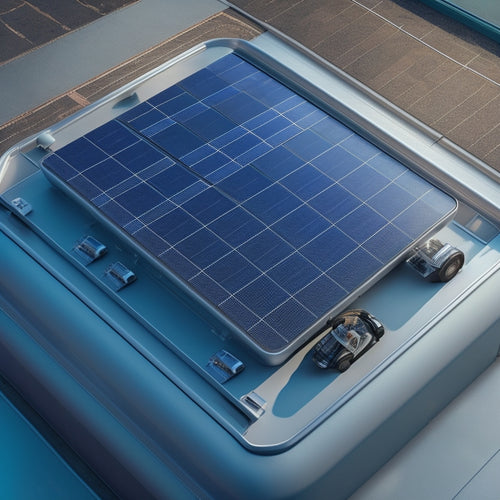
3 Best Tax Credits for Individual EV Buyers
Share
You're eligible for thousands of dollars in tax credits when buying an electric vehicle (EV). The federal government offers up to $7,500 in tax credits, which phases out based on the manufacturer's sales. Additionally, state and local governments provide rebates, tax credits, and exemptions on sales tax or use tax on EV purchases. For example, California offers a $2,500 rebate, and Colorado provides a $5,000 tax credit. Manufacturer-specific credits can also be combined with federal and state incentives, such as loyalty rebates for repeat customers. Explore these incentives further to maximize your savings.
Key Takeaways
• The federal EV tax credit provides up to $7,500 for eligible individual buyers, phasing out after the manufacturer reaches 200,000 sales.
• State incentives, such as California's $2,500 rebate and Colorado's $5,000 tax credit, can be combined with federal credits for additional savings.
• Manufacturer-specific credits, like those offered by automakers, can be combined with federal and state incentives for added benefits.
• Eligible buyers can claim the federal credit using Form 8936, keeping purchase records to support their claim.
• Excess credit can be carried over to subsequent tax years, maximizing the financial benefits for individual EV buyers.
Federal EV Tax Credit Incentives
You're eligible for a federal tax credit of up to $7,500 if you purchase a qualifying electric vehicle (EV) in or after 2010, as long as you're the original owner. This credit is a great incentive to contemplate an EV for your next vehicle purchase.
To determine your credit eligibility, the IRS has established a phase-out timeline based on the manufacturer's sales. The credit begins to phase out once a manufacturer reaches 200,000 EV sales in the US. At this point, the credit is reduced by 50% for two quarters, then by 25% for two more quarters, before being eliminated.
To claim the credit, you'll need to file Form 8936 with your tax return. Be sure to keep records of your purchase, as the IRS may request documentation. The credit can be used to offset your tax liability, and any excess credit can be carried over to future tax years.
State and Local EV Incentives
In addition to federal incentives, many states and local governments offer their own unique set of tax credits, rebates, and exemptions to encourage the adoption of electric vehicles.
You'll find that some states provide additional incentives for purchasing an EV, such as rebates or tax credits, which can be claimed on top of federal incentives. For instance, California offers a $2,500 rebate for buying an EV, while Colorado provides a $5,000 tax credit. Some states also offer exemptions from sales tax or use tax on EV purchases.
Moreover, local governments may offer incentives for installing local charging infrastructure, making it more convenient for you to charge your EV at home or on the go.
As you explore state and local incentives, keep in mind that some states have implemented Zero Emission Vehicle (ZEV) mandates, which require automakers to sell a certain percentage of EVs in those states. These mandates can drive demand for EVs and lead to more incentives for buyers like you.
Manufacturer-Specific EV Credits
Some automakers offer manufacturer-specific tax credits or rebates for purchasing their electric vehicles, which can be combined with federal and state incentives to further reduce the cost of buying an EV. As you explore your EV options, it's crucial to research the manufacturer-specific credits available for your desired vehicle.
Keep in mind that these credits often involve a Certification Process, which guarantees the vehicle meets specific environmental and safety standards. By taking advantage of these credits, you can enjoy additional savings on top of federal and state incentives.
For example, some manufacturers offer rebates for loyal customers, promoting Brand Loyalty and encouraging repeat business. When considering a manufacturer-specific credit, be sure to review the terms and conditions carefully, as they may vary depending on the automaker and your location.
Frequently Asked Questions
Can I Claim the EV Tax Credit if I Lease an Electric Vehicle?
'Like a key fitting perfectly into a lock, understanding the EV tax credit rules is essential. You can't claim the credit if you lease an EV, as the credit goes to the lessor, not you, regardless of lease duration or monthly payments.'
Do I Need to Itemize Deductions to Claim the EV Tax Credit?
When claiming the EV tax credit, you don't need to itemize deductions; instead, you'll report it on Form 8936 and claim it as a non-refundable credit, regardless of your tax filing status or whether you take the Standard Deduction.
Can I Claim the EV Tax Credit if I Buy a Used Electric Vehicle?
Did you know that 70% of EV buyers are first-time buyers? You can't claim the EV tax credit if you buy a used electric vehicle, even if it's from a private seller, as the original incentive only applies to new vehicles with previous owners.
Is the EV Tax Credit Refundable if It Exceeds My Tax Liability?
If your EV tax credit exceeds your tax liability, you won't get a refund, but you can carry over the excess as a Tax Credit Carryover for up to three years, making you eligible for an Excess Refund in future tax seasons.
Can I Claim the EV Tax Credit if I Buy an Electric Motorcycle?
As you rev up your eco-friendly journey, you're wondering if you can claim the EV tax credit for an electric motorcycle purchase. The answer is yes, you can, as long as it's a qualified vehicle, and you can reap Motorcycle Benefits from Eco Friendly Incentives.
Related Posts
-

Top Solar Panels for Car Battery Maintenance
When selecting top solar panels for car battery maintenance, consider high-efficiency models with high wattage output...
-

Charging Station Incentives: Why So Many Are Free
You're likely to stumble upon free or low-cost charging stations due to a convergence of incentives. Government rebat...
-

Reduce Solar Panel Cost for Your Small Home
By evaluating your energy needs, choosing the right installer, and selecting cost-effective solar panel options, you ...


